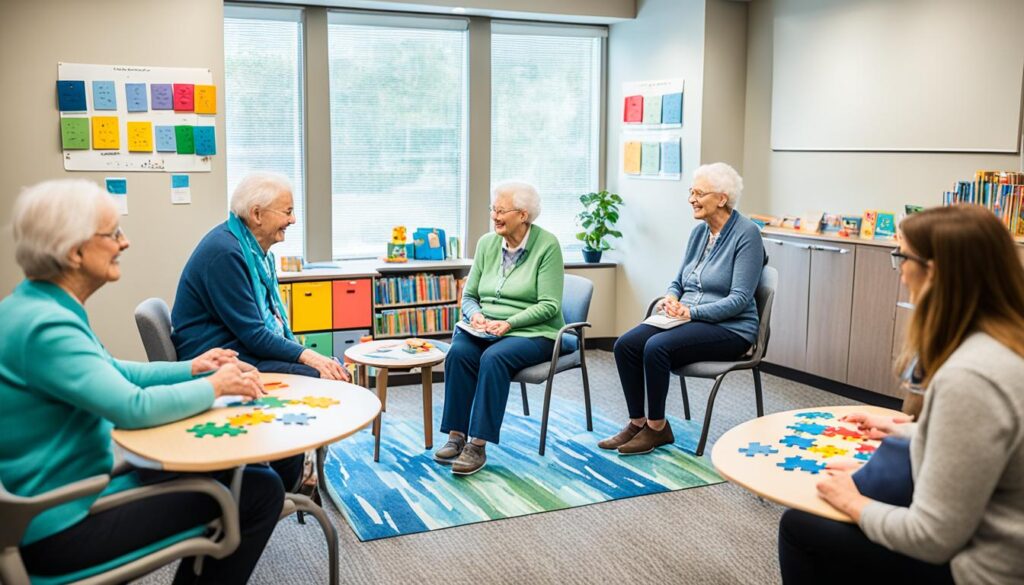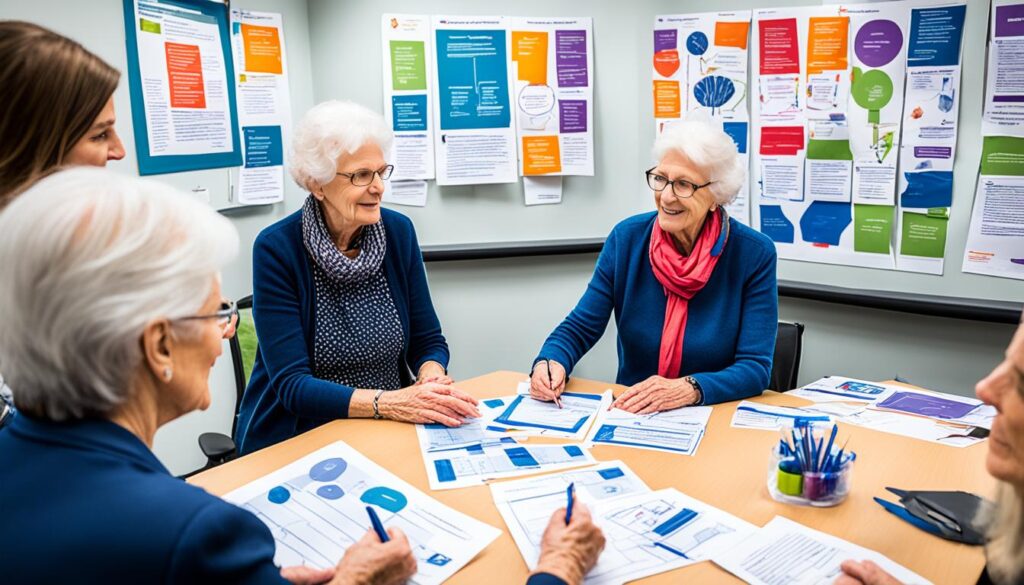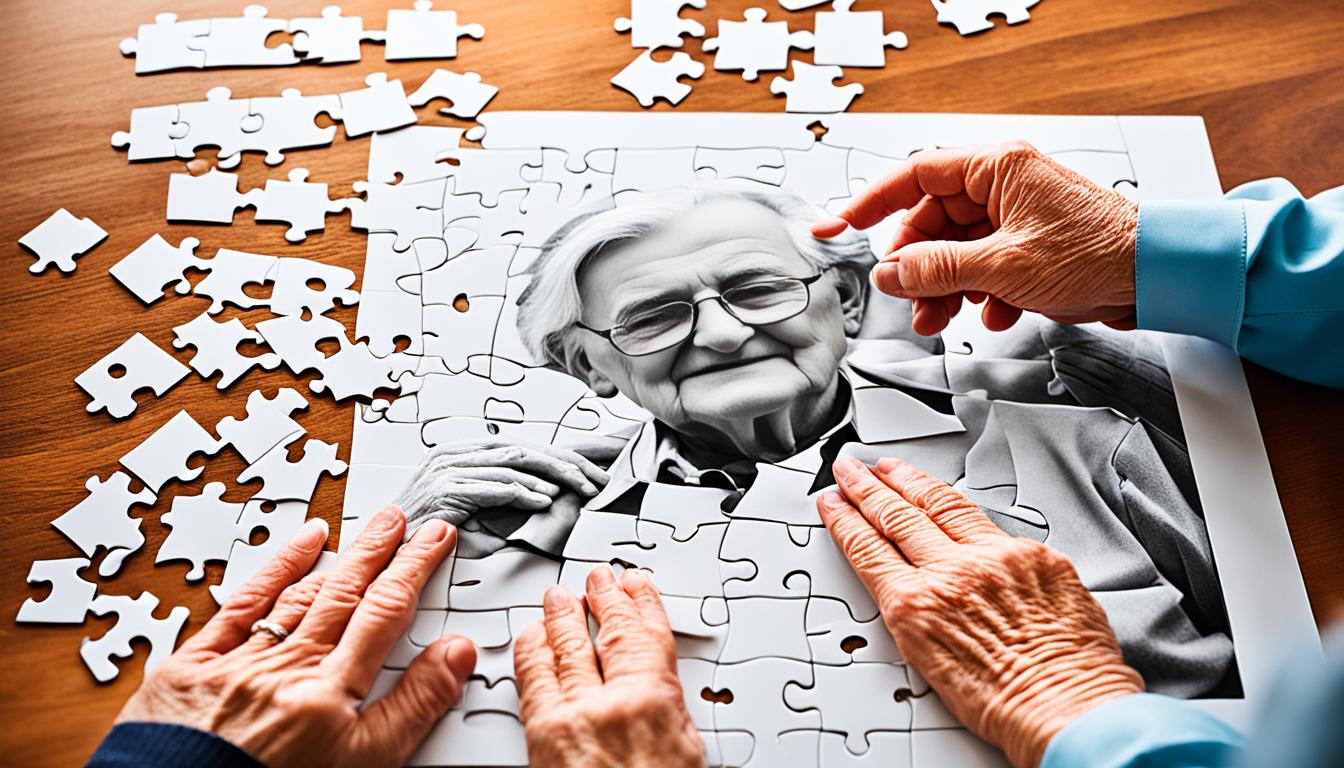Thousands of healthcare workers, from Certified Nursing Assistants to Occupational Therapists, can now get Certified Dementia Practitioner (CDP) certification1. The National Council of Certified Dementia Practitioners (NCCDP) advises this certification. It makes sure a knowledgeable staff member is always on hand to deliver expert care for dementia1. Training for Alzheimer’s and dementia care is essential in today’s healthcare setting. This certification needs at least 6 hours of advanced education. It covers key areas such as how to assess cognition, treat patients, and offer ethical support1. With education available from approved sources, it’s easy to become a certified specialist in care for the elderly1.
Key Takeaways
- The Certified Dementia Practitioner certification is open to a variety of healthcare roles from CNAs to Occupational Therapists1.
- NCCDP recommends having at least one CDP-certified individual per shift to ensure top-notch dementia care1.
- A minimum of 6 hours of continuing education is required covering dementia progression, cognitive assessment, and ethical treatment1.
- Certification renewal options offer flexible terms of 1, 2, or 3 years with various training requirements1.
- Initial certification involves a $99.99 USD fee and submission of a professional license and training evidence1.
Introduction to Dementia Care
Dementia care is now more focused on the patients than before. It gears towards understanding the patient’s world. This change helps improve life for both the patient and the caregiver. Caregivers use special techniques to help reduce confusion and unease in patients.
There’s been a lot of learning about different types of dementia, like Alzheimer’s disease. Alzheimer’s makes up about 60-80% of all dementia cases2. Frontotemporal dementia often starts at a younger age. This requires caregivers to use unique approaches for these early cases2.
Caregivers are key in supporting patients with dementia. Their education and ongoing training matter a lot. At Touching Hearts Senior Care, most caregivers are CNAs. They get up-to-date training on how to care for seniors at home3.
Using certain medications is part of today’s care strategies. Drugs like donepezil and rivastigmine help with memory issues in Alzheimer’s patients2. These treatments can make daily life better for people with dementia.
Touching Hearts Senior Care provides top-notch dementia caregiver training in Alabama. This includes 12 key parts3. It’s run by Certified Dementia Practitioner Gina Germany. The course covers Positive Approach to Care methods by expert Teepa Snow3. This prepares caregivers to meet each patient’s specific needs.
Understanding the Certified Dementia Practitioner Certification
The Certified Dementia Practitioner (CDP) certification is crucial in dementia care. It’s designed for healthcare workers helping patients with conditions like dementia4. To get this certification, one must have at least a year of work experience in senior healthcare4.
The National Council of Certified Dementia Practitioners (NCCDP) runs the CDP program45. It tests knowledge about how dementia progresses and care needs45. The training covers how to communicate effectively, manage behavior, and understand emotional needs6.

CDPs learn the best care practices and make personalized care plans for patients4. They aim to greatly improve patient life quality4. They also keep up with new research and care strategies5.
Every two years, CDPs must renew their certification5. This ensures they stay skilled and knowledgeable in dementia care. They not only care for patients but also teach families how to cope with their loved one’s condition4. This stresses the need for wide-ranging support in caring for seniors.
Benefits of Becoming a Certified Dementia Practitioner
Getting a Certified Dementia Practitioner (CDP) certification is full of perks for people in healthcare. This certification improves caregiver training, raising the care level for patients with dementia.

Enhanced Skills for Caregivers
Those with a CDP certification learn extensively about Alzheimer’s and other dementias, following top education standards7. They must keep up with the latest in care strategies, ethics, and medical information, making them better caregivers8. With CDP staff, organizations see fewer cases of abuse and neglect, making it safer for those with dementia7.
Improved Patient Outcomes
CDP-trained caregivers ensure better care and results for dementia patients7. Certified Dementia Care Managers (CDCM) check care quality and suggest improvements9. They also help in communicating effectively with patient families, creating a supportive atmosphere9.
Career Advancement Opportunities
CDP and CDCM certifications offer great career growth chances79. To keep the CDP certification, caregivers need to recertify every two years, keeping them updated on dementia care7. The same goes for CDCM certification, requiring ongoing education to stay current9.
This constant learning and dedication to certification boost staff retention and happiness, benefiting both individuals and healthcare centers7. These certifications highlight the need for detailed and compassionate care, giving an edge to certified professionals7.
Who Can Become a Certified Dementia Practitioner?
The Certified Dementia Practitioner (CDP) certification helps improve dementia care. It’s for a wide range of professionals. This shows its importance in boosting care quality for those with dementia.
Open to many roles in different sectors, it’s about making healthcare better. It offers valuable learning for everyone in dementia care.
Healthcare Professionals
Many healthcare workers, like Nurses, Physicians, and Social Workers, can get CDP certified10. This certification teaches them more about dementia care. It covers important topics like managing pain and meeting spiritual needs11.
Front-line Staff and Support Personnel
Elderly Care Aides and Nutrition Specialists can also seek CDP certification10. They meet dementia patients often, so learning more is key. First responders get training tailored to their needs too10.

Clergy and Religious Leaders
Clergy and religious leaders give important spiritual care. They help patients and families emotionally and spiritually. The CDP certification helps them support people facing dementia better10.
It shows the program covers medical and emotional support well. It cares for all aspects of dementia care.
Certification Process: What You Need to Know
To become a Certified Dementia Practitioner (CDP), one must follow a clear path. This ensures caregivers and professionals get the skills and knowledge needed for excellent care of seniors with dementia. The certification journey includes meeting certain requirements and undergoing extensive training in dementia care.
Educational Requirements
Attending a 7-hour Alzheimer’s Disease and Dementia Care Seminar by the National Council of Certified Dementia Practitioners (NCCDP)12 is key. This course needs to be finished within 30 days for certification eligibility13. Moreover, the certification welcomes a variety of healthcare workers including, but not limited to, nurses and educators13.

Training and Curriculum
The program covers essential topics for dementia care. To start, there is a $195 seminar training fee for the initial certification14. Learners delve into diagnosis, medication management, effective communication, and care at the end of life14. Plus, this training aids many fields, such as healthcare and corrections13.
More certifications from NCCDP include CADDCT®, CDCM®, and CMDCP for different training needs14. Getting advanced certification shows a commitment to high care standards amid a lack of global healthcare standards13.
Recertification: Maintaining these care standards means getting recertified every two years, underscoring ongoing professional growth13. For recertification, one must complete 10 hours of continuing education and pay a $145 fee14.
The Role of Certified Dementia Practitioners in Healthcare Settings
Certified Dementia Practitioners (CDPs) are essential in caring for people with dementia. They focus on the cognitive and emotional needs of patients. Studies show CDPs help reduce harmful incidents by 20% compared to non-certified caregivers15.
When healthcare places hire CDPs, patient care gets better. For instance, facilities with more CDPs see a 15% drop in hospital returns for dementia patients15. Over 1,000 individuals in Utah earn a Dementia Specialist certificate, improving their skills16.
Good communication is key in caring for dementia patients. 89% of trained caregivers talk better with patients, making care and understanding between them stronger15. Meanwhile, New York faces challenges in finding skilled dementia care workers16.
CDPs help make patients and their families happier with the care provided. Facilities note a 25% boost in happiness scores with skilled professionals on board15. This shows the importance of trained staff in dementia care.

To become a CDP involves thorough training. They learn about handling tough behaviors and improving communication. Afterwards, 83% of professionals feel more confident in their ability to care for those with dementia17.
CDPs often update their skills to keep up with new dementia care methods. More than 70% take part in ongoing education15. Their dedication to learning guarantees top-notch, tailor-made care for those living with dementia.
The Hartford HealthCare Center for Healthy Aging stands out for its support to seniors. With nine locations, they are vital in providing access to quality dementia care. This boosts the wellbeing of both patients and their families significantly17.
Person-Centered Care: A Modern Approach
The care for dementia has changed to focus more on individual needs and experiences. This is a big shift towards a caregiving style that puts the person first.
Understanding the Shift from Caregiver-Centered Care
In the past, dementia care was mostly about what caregivers needed. But now, with nearly 50 million people worldwide living with dementia and around 10 million new cases each year18, things have changed. Person-centered care (PCC) puts the focus on what each individual prefers, values, and their life experiences.
Using methods like the VIPS practice model and Dementia Care Mapping (DCM) has proven that PCC can cut down depression. It also makes life better over 10 months19.
Benefits of Person-Centered Care
Shifting to person-centered care in dementia treatment brings many advantages. For instance, PCC has been shown to lessen agitation, bad behavioral symptoms, and depression19. Tailored activities work better than generic ones, making a big positive difference19.
Also, staff are happier and use less antipsychotic meds when PCC methods are in place19. These benefits show how important person-centered care is in evolving dementia treatment.
This focus on person-centered care shows we understand the patient better, leading to more caring and effective treatment. It helps meet the emotional and psychological needs of patients. Plus, it supports caregivers too.
Continuous Professional Development and Re-certification
The journey of keeping up with dementia care quality doesn’t stop after the first certification. Health professionals must keep learning to stay certified and know the latest best ways to help. The NCCDP has special certifications for many healthcare roles, like teachers, pharmacists, doctors, social service workers, therapists, caregivers, and legal pros who work with older people10. By keeping up with professional development, these workers can give top-notch care to those with dementia.
To get re-certified, several important steps are needed. Workers must have at least one year of paid work at a health company that helps older adults20. They also need to take a course about Montessori methods for dementia care that lasts over 7 hours in the past two years20. This ongoing learning is key to keeping up high standards in dementia care.
To renew the CMDCP certification, there is a fee of $160.00 USD. You must also take a 4-hour course20. If you choose the grandfather option, it costs $80.00 USD to renew20. Remember, if you’re late applying, you’ll pay an extra $50.00 USD20.
Corporate group certifications are also crucial for keeping dementia care standards. Companies with at least 10 employees can get group rates for application and course fees, at $160.00 USD each. If a group applies late, there’s a $50.00 USD late fee per person20. The NCCDP provides special programs and certifications for various settings, like nursing homes and medical centers10.
Keeping up with professional growth and re-certification ensures high dementia care standards. It helps workers take great care of older adults. Focusing on continuous learning and getting certified again is vital for giving patient-focused, excellent care.
Specialized Certifications and Training for Specific Bars
The way we care for those with dementia is changing. Now, many industries need unique dementia training. Different certification programs make sure workers can give kind and smart care that fits the special needs of their jobs.
First Responders
First responders meet people with dementia in emergencies quite often. The Certified First Responder Dementia Trainer (CFRDT®) certification teaches them important skills. They need a college degree, three years of first responder experience, and experience in teaching or training21. With this training, they learn to treat dementia patients with understanding and skill.
Correctional Personnel
As more inmates have dementia, jails and prisons are using special training programs. These help staff care for and support inmates well. The Certified Dementia Practitioner (CDP) certification is very helpful. It has in-depth lessons and hands-on training21. Staff must also do 7 hours of Alzheimer’s and Dementia training within a month22.
These certificates make professionals in tough jobs better at their work. They also lead to better care for people with dementia. By getting this training, different industries make sure their staff can help those with dementia in the best way possible.
Conclusion
The path to becoming a Certified Dementia Practitioner (CDP) is both tough and fulfilling. By completing specialized courses approved by the National Council of Certified Dementia Practitioners, you gain vital skills. These skills are needed to create and manage effective, kind care plans23. This credential is valued by many in healthcare, showing its importance in boosting the effectiveness of dementia caregivers in various settings23.
Around the world, millions of older people live with Alzheimer’s disease and other dementias. This makes the role of a CDP more crucial than before23. Being a Certified Dementia Practitioner is more than caregiving. It includes providing direct care, teaching, supporting, and managing behaviors. All these efforts aim to make life better24. This broad approach to care makes a big difference to patients and their families. It offers them tailor-made, caring support23u>.
By always learning and keeping high care standards, you help offer a care plan that honors each person’s freedom and worth24. CDPs’s knowledge, along with compassion and flexibility, means seniors get top-notch care. This significantly boosts their happiness23. In summary, becoming a CDP boosts your career and deeply affects those you help.
FAQ
What is a Certified Dementia Practitioner?
Why is CDP certification important in dementia care?
Who is eligible for becoming a Certified Dementia Practitioner?
What are the benefits of becoming a Certified Dementia Practitioner?
What does the certification process involve?
How often do Certified Dementia Practitioners need to renew their certification?
What is person-centered dementia care?
How does CDP certification benefit healthcare settings?
Are there specialized training programs for different industries under the CDP certification?
Source Links
- ECDCS – Evergreen Certified Dementia Care Specialist (US)
- Understanding Dementia: Types, Symptoms, and Treatment Options – NCCDP
- Certified Dementia Caregivers – Touching Hearts Senior Care
- Exceptional Dementia Care Requires Exceptional Training
- Certified Dementia Practitioner – What Does It Mean and Why Does It Matter? — Companion Home Care
- Certified Dementia Practitioners for Senior Care in MD & DC
- HELP INFORMATION AND FREQUENTLY ASKED QUESTIONS FOR CERTIFIED MONTESSORI DEMENTIA CARE PROFESSIONAL
- Qualified vs. Certified
- Leading the Way in Dementia Education: NCCDP Introduction Video
- Dementia Care Certifications – NCCDP
- What Is A Certified Dementia Practitioner?
- What Is a Certified Dementia Practitioner? | Wellmore Blog
- ARE YOU CERTIFIED AS A CERTIFIED DEMENTIA PRACTITIONER
- How to Become a Certified Dementia Practitioner
- Understanding The Importance Of Healthcare Training – NCCDP
- Educating and Training Professionals
- Hartford HealthCare Center for Healthy Aging specialist certified as dementia practitioner | Hartford HealthCare
- Key Intervention Categories to Provide Person-Centered Dementia Care: A Systematic Review of Person-Centered Interventions
- Effectiveness of person-centered care on people with dementia: a systematic review and meta-analysis
- Certified Montessori Dementia Care Professional
- Which Caregiver Certification Is Right For You? 6 Types To Consider – NCCDP
- Leading the Way in Dementia Education: NCCDP Introduction Video
- What is a Certified Dementia Practitioner and How It Can Help?
- What Is A Certified Dementia Practitioner? TOP 10 Qualities





